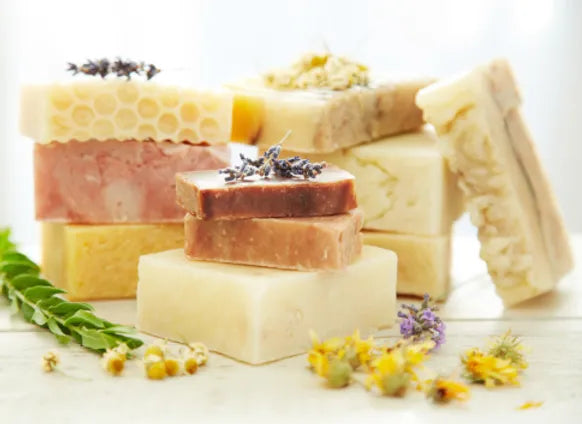
The soap, since it is deliberately rubbed into the skin, should be a major concern for you when you really think about it. Indeed, you pay attention to the water you drink and the food you eat, so why wouldn't you pay close attention to what you expose your skin to?
One way to reduce your skin's exposure to potentially harmful toxins is to use an organic, natural soap.
What is a natural soap?
Natural soaps are made from natural ingredients. They normally consist of a mixture of butters and oils derived from various plants. These substances are rich in vitamins, nutrients and antioxidants.
Skin, hair and other parts of the human body need these substances to stay healthy. Many natural soaps also contain other beneficial ingredients, such as clays, salts, essential oils, and botanical extracts.
Handmade soaps take longer to produce and generally use higher quality ingredients, hence the extra cost. In addition, they tend to be the ideal option for sensitive skin. It's important to try a variety of natural soaps to find the one that best suits your skin type and preferences.
Why should you care about the soap you choose
The word "soap" is used to refer to all kinds of skin cleansers, solid, liquid or even powder. Within each of these categories, there are different colors, scents, shapes, packaging and claims that make them up.
Some soaps deodorize, others are antimicrobial, anti-aging, moisturizing and more. Everyone uses the soap, several times a day in most cases. And besides, it is one of the main tools for preventing the transmission of certain bacterial and viral diseases.
But not all soaps are equal in potency or effectiveness, and not all are good for the skin.
There are two basic types of soap:
● Artisanal, handmade and natural soaps
● Industrial soaps, made in factories
Soaps made in factories are usually much cheaper than handmade soaps.
Let's explore the world of natural soap and see if the benefits it offers are worth the extra cost. Modern science has proven what common sense already assumed: environmental toxins are, to a large extent, absorbed through the skin.
The skin is the largest organ in the human body and the most in contact with the outside world. Therefore, what you put in contact with your skin should be a major concern for you as well as what you eat.
The benefits of using natural soap
There are several advantages of using natural soap:
● Natural soap is very hydrating: Handmade soaps contain glycerin and therefore moisturize the skin during bathing.
● The ingredients used are better than industrial soaps: When a company makes hundreds of thousands of soaps at a time, part of the profit margin comes from mass production and part comes from using the least expensive products. expensive ones available - and these are often synthetic substitutes.
● The choice is wider: Organic soaps are normally made in small batches by a local producer. This not only means easier control, but also a greater variety of products. Each batch is easily adapted with a new fragrance or a new color without having to readjust the entire production chain like at the factory.
● The product is unique and handmade: Natural soaps are different in that they vary slightly from bar to bar, just as natural ingredients vary slightly depending on the weather in any given year and other conditions. Where they do vary, however, is in the lack of harmful ingredients and the abundance of healthy ingredients found in each bar.
● Richness in antioxidants: the ingredients used in organic soaps contain many natural antioxidants and the process does not extract these substances for other purposes. Natural soaps can actually help repair the skin by reducing inflammation and keeping it hydrated. for younger, healthier looking skin. The milder pH levels of organic soaps (usually between 9 and 10) help care for your skin in the long run, while keeping you looking and feeling clean and fresh right away.
At OKHAMARE, you will find soaps made from natural plants for healthy skin. See you on the website to find out more www.okhamare.com

